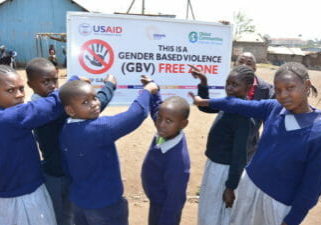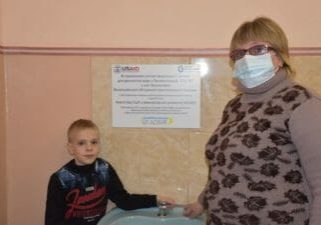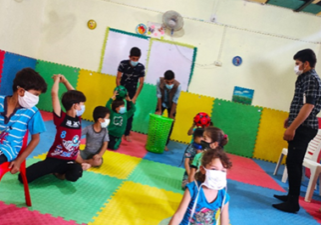News > Blog
‘Global Community’ Provides Water for Tinjase Community
Published 03/08/2021 by globalcommunities
This article was originally published by GhanaWeb
Global Communities, a Non-Governmental Organisation (NGO), has handed over a potable water system for the community of Tinjase, an expanding settlement near the Ghana-Togo border in the Nkwanta North District of the Oti Region.
The small town water supply system, the first of its kind in the community, is a 2.3 million USD project funded by the USAID under its WASH for Health programme and comprises a 100,000-litre storage tank that is connected to eight standpipes strategically distributed.
The water is sourced by mechanised boreholes integrated with photovoltaic systems, chlorinated and piped through over 11,000 meters of transmission and distribution lines, and is expected to benefit over 5,000 people in Tinjase and surrounding communities.
It was constructed in 2020 by Medeboa Ventures Ltd within six months.
Institutions including the CHPS compound, basic school, Police station, and the chief’s palace have been hooked up, and more than 30 households have also connected to the facility.
The water has also been piped to the homes of five persons living with disabilities in the community.
The project provided a well-equipped office for a water management board set up and equipped to manage and maintain the facility under the watch of the NGO.
Mr Dominic Osei, Deputy Chief of Global Communities, said the project was initiated to accelerate sustainable access to water and sanitation.
He said the WASH for Health programme has succeeded in providing a total of 220 boreholes benefiting over 60,000 people in the nine implementing regions, while over 170,000 people have gained relief with the construction of over 22,400 household latrines.
Mr Osei added that over 800 communities had been declared ODF, and called on stakeholders to support efforts to attain district-wide sanitation.
He said Tinjase had recorded an 80 percent household latrine coverage and commended the community for efforts to connect their homes to the water supply system.
Mr Jackson Jakayi, District Chief Executive of Nkwanta North extolled Global Communities for implementing over the years, lots of projects that helped improve upon the livelihood of the people.
“Life has been brought to Tinjase,” he remarked and said the government was bent on clocking Goal 6 of the SDGs and would continue to support the efforts of entities such as USAID.
Mr. Abdulaziz Mamuodu, Nkwanta North District Health Director said potable water challenges caused diarrhea and typhoid cases to prevail among the top OPD attendances in the district.
He commended Global Communities for intervening during the COVID-19 pandemic, where access to water remained crucial to efforts to contain its spread.
The Director said the project supplied water to some CHPS compounds in the area and appealed for the rest to be served.
“Gone are the days when people shared contaminated water with animals, and we are grateful to Global Communities for the intervention,” Ubor Mamun Kwame II, Chief of Tinjase stated, adding that the community would require more and was ready to support.
The Chief, in appreciation, installed Mr Osei as a development chief, while the District Health Directorate awarded Global Communities with a citation for championing water security for the community.
Mr James Lomotey, Volta and Oti Regional Coordinator for Global Communities said to the Ghana News Agency that the retention of girls in particular in school was achievable with the availability of sustainable water.
He said the NGO was hopeful hygiene and sanitation outcomes would improve in the communities and would continue to work with stakeholders including the Environmental Health Department to ensure total household latrine coverage.
Global Communities and its partners have been supporting water access, sanitation, and hygiene, mostly in rural areas.
It has been active in helping communities improve sanitation by helping provide access to simple and cost-effective toilet facilities, and provides tippy-tap construction, and water storage and retrieval skills as soft components of its activities.
Areas served are being encouraged to position as model communities for others to look up to.






